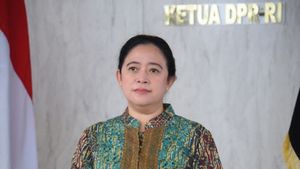JAKARTA - The parliament's commitment to continue to oversee the implementation of Law No. 12 of 2022 concerning the Crime of Sexual Violence (UU TPKS) has received appreciation for being able to fight for the rights of women.
This was conveyed by the Female Activist from the Sarinah Institute, Luky Sandra Amalia. According to him, the struggle of the parliament, especially the Speaker of the DPR, Puan Maharani, in fighting for gender equality, was again seen when she highlighted the incident of arrest marriage in Southwest Sumba Regency, East Nusa Tenggara (NTT).
"I agree with the statement of the Speaker of the DPR that women have human rights as human beings guaranteed by the state. Therefore, cases like this should no longer happen," said Amalia, Wednesday, September 13.
In this case, Amalia assessed that there was still an imbalance in power relations that cornered women. She said that Puan realized that there were still many women being treated as objects. Whereas in the principle of human rights (HAM), every woman has the right to determine her partner herself.
"This case shows how women are still placed as sub-ordinators that can be regulated by their coordinating parties, including their own parents," explained Amalia.
"We can see that there are still many women who are treated as objects, as if the woman cannot determine the direction of her own life so when and with whom they should get married is also regulated by those who feel they have the right to be women," he added.
In line with Puan, Amalia emphasized that forced marriage is a point regulated in the TPKS Law. As one of the figures who participated in fighting for the TPKS Law, Puan is considered to continue to be committed so that the law is implemented properly.
"One of the important legal instruments in this case is the TPKS Law which is the legal umbrella related to criminal acts of sexual violence," said Amalia.
The researcher at the Center for Political Research, National Research and Innovation Agency (BRIN) said that incidents of violence against women wrapped in culture from generation to generation should change with the times. Moreover, said Amalia, there is already a TPKS Law that prohibits forced marriage, including those on behalf of cultural practices.
"As a legal umbrella, the TPKS Law requires a set of derivative regulations so that this legal umbrella can cover cases of criminal acts of sexual violence more effectively," he explained.
Furthermore, Amalia is of the view that there are still many cases of sexual violence that occur where most of the victims are women. For this reason, derivative rules are needed as has been continuously voiced by many members of the DPR.
"We all certainly hope that the DPR in the current period, while it is still led by a woman, can urge her working partner, namely the Government, to immediately issue derivative regulations so that the implementation of the TPKS Law is more effective," Amalia hoped.
On the other hand, Amalia said that there are other important things that need to be done other than the issuance of derivative regulations for the TPKS Law. Such as providing education to the public about the role of the TPKS Law. According to Amalia, this step is important so that there are no more customs or cultures that conflict with legal regulations.
"This is important considering that there are still many cases of sexual violence that occur around us, most of whose victims are women and children of the nation's future generation," said the PhD student at the University of Sydney.
Previously, the Chairman of the Indonesian House of Representatives, Puan Maharani, highlighted the arrest marriage incident that occurred in Southwest Sumba Regency, NTT. She emphasized that women have the right to make their choice, because it is a human right.
Puan also understands the importance of respecting cultural diversity in Indonesia, but she reminded that culture should not injure women's rights.
"Now we already have the TPKS Law which regulates the prohibition of forced marriage. This rule must be enforced and well socialized to the community, especially religious leaders and traditional leaders in the regions," said Puan.
"So this culture of forced marriage is a matter that violates the law and can be punished," said Puan.
A number of DPR members also often voice the importance of implementing the TPKS Law in cases of sexual violence, especially those that occur in women. One of them is Member of Commission III of the DPR RI Didik Mukrianto.
Didik regretted the implementation of the TPKS Law which was often not used in referrals to the application of punishment in cases of sexual violence.
SEE ALSO:
"We are fighting against sexual violence which is already like an iceberg phenomenon. The police must be at the forefront of supporting the eradication of sexual violence, one of which is by enforcing the TPKS Law," said Didik Mukrianto, Thursday (24/).
Didik mendesak agar segala bentuk pidana kekerasan seksual diusut dengan UU TPKS. Hal ini lantaran banyak pidana kekerasan seksual yang diketahui belum menggunakan referral UU TPKS dengan dalasan belum adanya aturan teknis.
Therefore, Didik again reminded the Government to quickly issue derivative regulations so that the TPKS Law could be more effective.
"The TPKS Law is not only effective against law enforcement, but can also better protect victims of sexual violence in various aspects," explained Didik.
The English, Chinese, Japanese, Arabic, and French versions are automatically generated by the AI. So there may still be inaccuracies in translating, please always see Indonesian as our main language. (system supported by DigitalSiber.id)

















